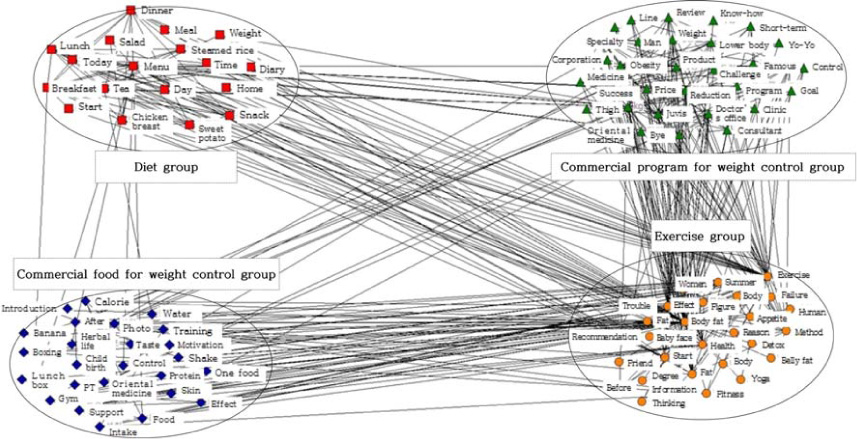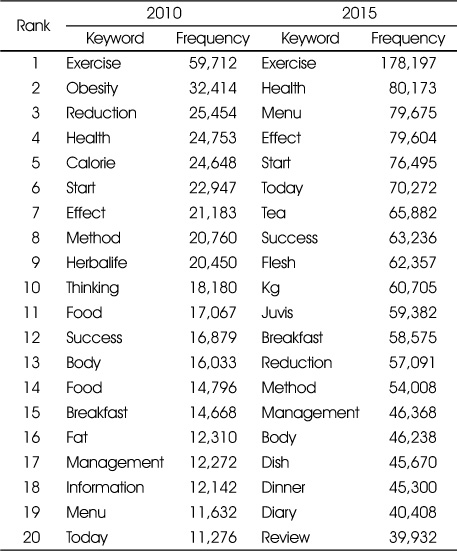References
1. Choi NE. 33 secrets of food you did not know Seoul: Kyunghyang Media; 2012. p. 349–352.
2. Kim EK, Park TS, Park YS, Jang MR, Lee KW. The content analysis of food and nutrition articles in the Korean newspapers: from January 1960 to June 1996. II. nutrition in life cycle, health and disease. Korean J Dietary Culture 1996. 11(4)p. 527–538.
3. Ryu HK. A survey of adolescents' concern and perception about body image: at Miryang city. Korean J Community Nutr 1997;2(2):197–205.
5. Lee KS. A study of diet package for the Xers to create proper way of diet: suggesting research and development of pulmuone diet package. Res Bull Package Des 1998;5:91–111.
6. Korean society. Atkin's diet fact and fiction. Korean J Obes 1998;7(2):101–102.
7. Shin JH, Lee HJ, Choi WY. Review on the wellbeing discourse in the Korean society: focused on the critical interpretation of new cultural trend of leisure. J Leis Stud 2006;4(1):39–53.
8. Kim SS. Popular diet-fact and fiction. Korean J Obes 2002;11(1):11–18.
9. Yim KS. Commercial obesity management program. Korean J Community Nutr 2003;8(3):424–432.
10. Lee JS. 43 Diet secrets that your doctor does not tell you Gyeonggi: MOABOOKS; 2009. p. 34.
11. Nam SW, Koh EH. Mundane heroes in reality show: obesity discourses of diet king and its cultural significance. Korean J Sociol Sport 2011;24(2):69–97.
12. Lim IS, Kim MJ. Reproduction of obesity stigma in Korean TV diet survival programs: focused on ‘BIGsTORY' and ‘Diet War'. J Korean Womens Stud 2012;28(4):1–38.
13. Na EK. “”Eating broadcasts” and “Cooking broadcasts” exploratory study on food media trends: socio-cultural backgrounds and new media use factors. Kookmin Soc Sci Rev 2015;28(1):183–215.
15. Lee OJ, Park SB, Chung DU, You ES. Movie box-office analysis using social big data. J Contents Assoc 2014;14(10):1–12.
16. Hwang MG, Chop DJ, Lee HG, Choi C, Ko BK, Kim PK. Domain n-gram construction and its application. J Korean Inst Inform Sci Eng 2010;37(2):47–51.
17. Diesner J, Carley KM. Causal mapping for research information technology London: IDEA GROUP PUBLISHING; 2005. p. 81–83.
18. Ahn HJ. Extraction of keywords from brand images texts using network analysis. J Korean Inst Inform Technol 2012;10(2):176–182.
19. Moon JY. A study of the intellectual structure of secretarial studies using network analysis. J Secretarial Stud 2013;22(1):125–145.
20. Ahn MS, Oh IK. Analysis of attitudes on using five-star hotel packages applying network text analysis method. Korea Acad Soc Tourism Manag 2015;30(5):163–181.
21. Wasserman S, Faust K. Social network analysis: methods and applications Cambridge: Cambridge university press; 1994. p. 370–374.
23. Kwak HP, Koo KJ. Relationship of leisure dance participation, physical image and self-esteem among women. J Korea Contents Assoc 2010;10(8):407–416.
24. Kim MS. Eating behavior of university students by economic environment. Korean J Food Cookery Sci 2005;21(2):125–138.
25. Kim MJ. A survey of dining-out behaviors and menu preferences of university students in the Seoul area. Korean J Food Cookery Sci 2008;24(4):525–535.
26. Hwang GJ, Kim GI. Study on dancers' physical perception of self according to dietary habits. J Korean Soc Dance Sci 2010;20:1–14.
27. Yoon JW. Cultural criticism: “Pretty Boys” and the “Six-Pack”: masculinity in popular culture today. Eng Stud Korea 2010;28:278–302.
28. Kim S. Rethinking television food program and national food culture in South Korea since the 1980s. Stud broadcasting cult 2015;27(2):85–122.
29. Sung MS, Jung HY, Choi JH, Lee SC, Choi BH, Park SS. Preparation of functional healthy drinks by acanthopanax senticosus extracts. J Life Sci 2014;24(9):959–966.
30. Jeong YG, Lee IS. Importance-performance and willingness to purchase analyses of home replacement using eco-friendly food ingredients in undergraduates according to gender. J Korean Soc Food Sci Nutr 2015;44(12):1873–1880.
31. Kim HJ, Lee HG. Body project of women and the discourse of sports. Korean J Sport Sci 2009;20(4):844–853.
32. Kim MK, Lee GC. Weight reduction dieting survey and satisfaction degree and diet related knowledge among adult women by age. J Korean Soc Food Sci Nutr 2006;35(5):572–582.
35. Pack HJ. Various diet methods currently in vogue among the individual. Korean J Obes 2004;8:470–471.
36. Sul MS, Park DY. A prediction of demand for female sport participants by using seasonal ARIMA model. J Korean Phys Educ Assoc Girls Woman 2011;25(3):179–192.
38. Kim SY. Relationship between eating style and food intake of healthy female college students during chuseok holidays. Korean J Community Nutr 2016;21(2):131–139.





